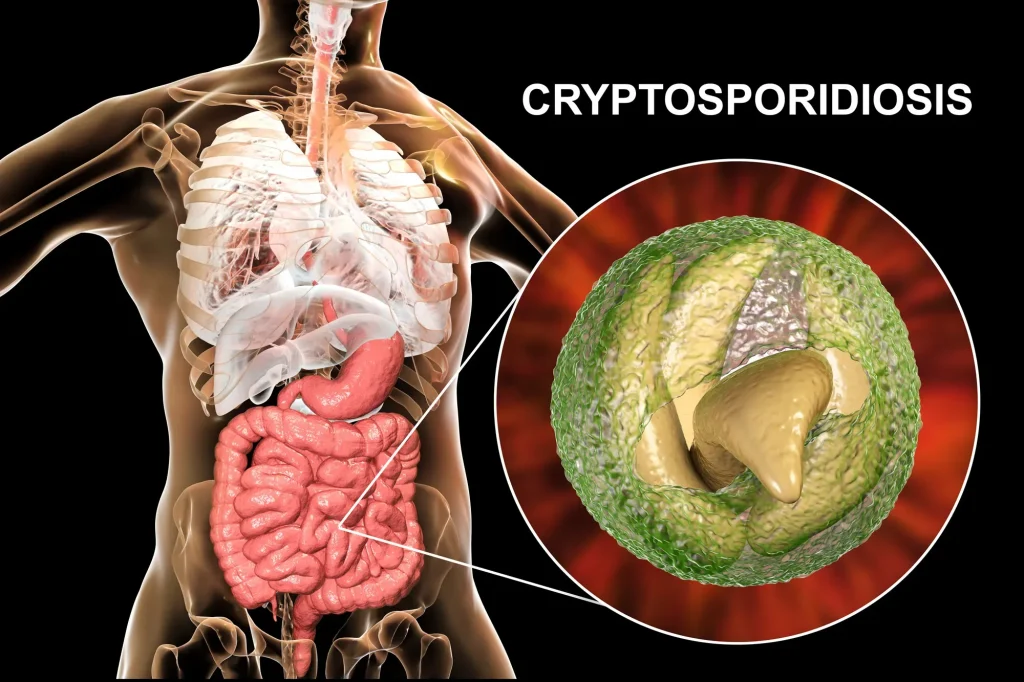The recent cryptosporidium outbreak linked to Cowbridge Farm Shop in Wales has raised significant concerns among health officials, revealing a concerning rise in infections among visitors. Initially reported at 47 cases, health authorities now report that 74 individuals have fallen ill after attending calf and lamb feeding sessions, with public health Wales emphasizing the importance of awareness regarding cryptosporidiosis symptoms. Symptoms may range from stomach cramps to severe gastrointestinal issues that can affect even the healthiest individuals. Those visiting the farm, especially children, are reminded of the risks associated with contaminated surfaces and the potential for farm visit infections. As investigations continue, it is crucial for anyone experiencing these symptoms to seek medical advice promptly, particularly given the alarming rise in hospitalizations reported.
The emergence of a cryptosporidium infection has stirred alarm following a troubling outbreak at a renowned farm shop in Wales. This parasitic illness, commonly referred to as ‘crypto,’ poses a significant public health risk, especially among individuals who have participated in interactive farm activities. Symptoms associated with this infection can mimic those of more benign gastrointestinal disturbances, complicating timely diagnoses and treatment. Health authorities are actively monitoring the situation while stressing the importance of hygiene practices on farm visits, given the threat of contaminated surfaces. As the investigation by Public Health Wales unfolds, visitors are strongly encouraged to stay vigilant and report any concerning health changes.
Current Status of the Cryptosporidium Outbreak in Cowbridge
The recent cryptosporidium outbreak at Cowbridge Farm Shop has escalated significantly, with health officials now reporting a total of 74 infections among visitors. Initially identified in late April, the situation has rapidly evolved, causing concern for public health. The infection’s spread among those who participated in calf and lamb feeding sessions highlights the challenges of managing such outbreaks in petting zoos and farms. Public Health Wales is actively collaborating with the farm and other health organizations to monitor and mitigate the impact of this alarming infection.
With the increase in reported cases over the past few weeks, health professionals are urging the community to remain vigilant. Symptoms of cryptosporidiosis, including gastrointestinal distress, should not be taken lightly. Victims who attended the Cowbridge farm and are now feeling ill are encouraged to contact their general practitioner immediately. The hospitalizations of 16 individuals from this outbreak further underscore the seriousness of the situation.
Understanding Cryptosporidiosis Symptoms and Risks
Cryptosporidiosis is primarily transmitted through contaminated surfaces, direct contact with infected animals, or through fecal matter from infected individuals. Symptoms can usually be mild, often resembling those of food poisoning or irritable bowel syndrome, including stomach cramps, diarrhea, and vomiting. Unfortunately, more serious manifestations, such as bloody stools, can provoke anxiety as they may mimic signs of more severe gastrointestinal conditions, including bowel cancer.
Vulnerable groups, including the elderly, pregnant women, and those undergoing immunosuppressive treatments, are at a higher risk for severe illness due to cryptosporidiosis. Health officials emphasize the importance of good hygiene practices, especially after visiting farms. Washing hands thoroughly and avoiding the preparation of food for others while symptomatic can greatly reduce the risk of spreading the infection.
Public Health Measures Following the Cowbridge Farm Incident
In the aftermath of the Cowbridge Farm Shop outbreak, Public Health Wales has implemented several public health measures aimed at preventing further infections. The farm has paused all feeding and petting sessions while officials conduct a thorough investigation into the source of the outbreak. They are also educating visitors and the general public about the importance of hygiene when visiting farms to reduce the risk of infection from cryptosporidium and other zoonotic diseases.
Additionally, health authorities have advised individuals who visited the farm to monitor for symptoms of cryptosporidiosis and seek medical advice if they develop any gastrointestinal problems. Increased surveillance and testing in the area will help identify new cases early and provide necessary interventions to protect public health. The recent attention on the outbreak serves as a crucial reminder about the risks associated with animal interactions, particularly in petting zoos.
The Role of Cowbridge Farm Shop in the Outbreak
Cowbridge Farm Shop has become a focal point in the ongoing investigation into the recent cryptosporidium outbreak. As a popular destination for families seeking interactive agricultural experiences, it is critical for the shop to address the hygiene concerns raised by health authorities. The farm’s cooperation with Public Health Wales, including ceasing feeding sessions, demonstrates a commitment to safeguarding the health of its visitors and re-establishing public trust.
The incident emphasizes the need for farm operators to implement stringent hygiene protocols to prevent contamination. Measures could include regular sanitization of surfaces, proper waste disposal, and ongoing training for staff on infection control practices. By prioritizing these practices, Cowbridge Farm Shop and similar establishments can help mitigate the risk of future outbreaks, ensuring a safe experience for families.
Preventing Farm Visit Infections and Promoting Safety
Preventing infections linked to farm visits, such as those related to the recent cryptosporidium outbreak, requires both public awareness and responsible practices by farm operators. It is essential for families visiting farms to understand the risks of zoonotic infections, especially when interacting with animals. Public Health Wales and surrounding health authorities play a critical role in educating the public about signs and symptoms of infections and the proper hygiene measures to take before and after visits.
Farm visits can be enjoyable and educational, but it’s crucial to prioritize safety. Simple actions, such as washing hands immediately after petting animals or avoiding contact with animal feces, can effectively reduce the risk of contracting cryptosporidium and other pathogens. Encouraging farms to establish clear hygiene guidelines and posting symptom awareness signs can serve as valuable resources for visitors, promoting a healthier farm experience.
The Importance of Reporting Gastrointestinal Symptoms
In light of the recent cryptosporidium outbreak, public health officials are emphasizing the importance of reporting gastrointestinal symptoms. Visitors to Cowbridge Farm Shop who develop symptoms such as diarrhea, abdominal pain, or vomiting should closely monitor their health and seek medical assistance if symptoms persist. Early detection and reporting are crucial in containing the spread of cryptosporidiosis.
Health authorities advise individuals experiencing symptoms to stay home from work or school until they have been symptom-free for at least 48 hours. This self-isolation helps prevent further transmission of the infection. Additionally, reporting these symptoms to a healthcare provider can assist in tracking the outbreak’s progress and understanding how cryptosporidiosis spreads within communities.
Lessons Learned from Previous Cryptosporidiosis Outbreaks
The recent outbreak in Cowbridge is not an isolated incident; previous outbreaks have demonstrated the ongoing risk associated with cryptosporidium infections, particularly from farm visits. The UK Health Security Agency has reported similar clusters in the past, including a significant incident in Devon, where over 100 individuals fell ill due to contaminated water sources. These past outbreaks highlight the persistent nature of this pathogenic threat and the importance of strict hygiene practices in preventing future occurrences.
Learning from these outbreaks involves enhancing public education about the risks associated with farm visits, especially among children who are more susceptible to infections. Furthermore, authorities need to refine their response strategies to ensure a rapid and comprehensive investigation of new cases. By improving the response time and raising awareness, future outbreaks can be managed more effectively, ultimately protecting public health.
Community Response and Support During the Outbreak
The ongoing cryptosporidium outbreak has prompted a wave of community response and solidarity, particularly among residents of Cowbridge and surrounding areas. Local health officials have been mobilizing resources to support those affected, providing advice on health management and prevention measures. This community spirit is essential for ensuring that residents feel supported and informed during this uncertain time.
In addition to direct health support, community members are coming together to offer assistance to those experiencing illness or anxiety due to the outbreak. Awareness campaigns on social media platforms have emerged, reminding individuals to adhere to public health guidance and emphasize the importance of communicating with healthcare providers about potential symptoms. This collaborative effort reflects the resilience of the community in addressing public health challenges.
The Ongoing Investigation and Future Precautions
As investigations by Public Health Wales continue, the emphasis remains on understanding the source of the outbreak and improving future safety measures across all farms. Comprehensive testing and environmental assessments at Cowbridge Farm Shop are critical steps in identifying how cryptosporidium transmission occurred. This ongoing investigation not only aims to safeguard the public but also seeks to ensure that future visitors can enjoy safe experiences on farms.
Moving forward, it will be crucial for farms to implement ongoing monitoring and hygiene practices to prevent similar outbreaks. Educating staff about zoonotic diseases, investing in effective cleaning protocols, and engaging with health authorities will create a proactive environment for minimizing the risk of infections. By embracing these practices, the agricultural community can better protect public health while continuing to provide educational and enjoyable farm visits.
Frequently Asked Questions
What are the symptoms of cryptosporidiosis related to the recent cryptosporidium outbreak in Cowbridge?
Symptoms of cryptosporidiosis linked to the recent cryptosporidium outbreak include gastrointestinal issues such as stomach cramps, vomiting, and diarrhea. In severe cases, individuals may also experience blood in their stools, especially those who are vulnerable, like the elderly or immunocompromised.
How can I prevent infection during a visit to Cowbridge Farm Shop amid the cryptosporidium outbreak?
To prevent infection during a visit to Cowbridge Farm Shop and avoid the cryptosporidium outbreak, practice good hygiene by washing hands frequently, especially after touching animals or contaminated surfaces, and avoid direct contact with feces or any suspected contaminated areas.
What is Public Health Wales doing about the cryptosporidium outbreak linked to Cowbridge Farm Shop?
Public Health Wales (PHW) is actively investigating the cryptosporidium outbreak linked to Cowbridge Farm Shop, monitoring reported cases, and has halted feeding and petting sessions at the farm. They encourage anyone experiencing symptoms after visiting to contact their GP for advice and assessment.
What steps should I take if I visited Cowbridge Farm Shop and have symptoms of cryptosporidiosis?
If you visited Cowbridge Farm Shop and are experiencing symptoms of cryptosporidiosis, such as diarrhea or vomiting, you should contact your GP for guidance and refrain from attending work or school until symptom-free for at least 48 hours.
Why is the cryptosporidium outbreak concerning for public health?
The cryptosporidium outbreak is concerning for public health because cryptosporidiosis can lead to severe gastrointestinal illness, particularly threatening vulnerable populations. The rapid rise in reported cases from Cowbridge Farm Shop indicates a larger issue that needs monitoring and prevention.
What historical context is there for cryptosporidiosis outbreaks in the UK?
Historical context for cryptosporidiosis outbreaks in the UK includes significant incidents, like the one last year in Brixham, Devon, where contaminated water linked to infected feces caused over 100 infections. The UK Health Security Agency warns of ongoing risks associated with farm visits.
How is cryptosporidium spread and how does it relate to farm visit infections?
Cryptosporidium is spread through contact with infected feces from animals or humans, often in environments like farms where contamination can occur on surfaces. This relation to farm visit infections highlights the need for proper hygiene and caution when interacting with animals.
What hygiene precautions should be taken to avoid cryptosporidium infection on farms?
To avoid cryptosporidium infection on farms, it is essential to practice good hygiene such as frequent hand washing, keeping personal items and clothing clean, and avoiding eating or drinking in areas where animals are present.
| Key Point | Details |
|---|---|
| Outbreak Location | Cowbridge Farm Shop, Wales |
| Number of Infected | 74 confirmed cases of cryptosporidium |
| Initial Reports | Originally reported only 47 cases |
| Hospitalizations | 16 individuals hospitalized, expected to increase |
| Symptoms | Gastrointestinal issues: cramps, vomiting, potential blood in stools |
| Transmission | Contact with infected feces or contaminated surfaces |
| Risk Groups | Elderly, pregnant women, and cancer patients are more vulnerable |
| Infection Control | Infected individuals advised to isolate for 48 hours after symptoms |
| Previous Outbreaks | Previous similar incidents, like the one in Brixham, Devon last year |
Summary
The recent cryptosporidium outbreak at a petting farm in Wales has raised concerns among health officials, revealing a greater impact than initially thought. With 74 reported infections and 16 hospitalizations, the situation highlights the crucial need for public awareness and hygiene practices. Immediate action is required to prevent further spread, especially among vulnerable populations.



